Philosophical Foundations of Evolutionary Psychology
Philosophical Foundations of Evolutionary Psychology
August John Hoffman
LEXINGTON BOOKS
Lanham Boulder New York London
Published by Lexington Books
An imprint of The Rowman & Littlefield Publishing Group, Inc.
4501 Forbes Boulevard, Suite 200, Lanham, Maryland 20706
www.rowman.com
Unit A, Whitacre Mews, 26-34 Stannary Street, London SE11 4AB
Copyright 2016 by Lexington Books
All rights reserved . No part of this book may be reproduced in any form or by any electronic or mechanical means, including information storage and retrieval systems, without written permission from the publisher, except by a reviewer who may quote passages in a review.
British Library Cataloguing in Publication Information Available
Library of Congress Control Number: 2015952408
ISBN: 978-1-4985-1815-4 (cloth : alk. paper)
eISBN: 978-1-4985-1816-1
 The paper used in this publication meets the minimum requirements of American National Standard for Information SciencesPermanence of Paper for Printed Library Materials, ANSI/NISO Z39.48-1992.
The paper used in this publication meets the minimum requirements of American National Standard for Information SciencesPermanence of Paper for Printed Library Materials, ANSI/NISO Z39.48-1992.
Printed in the United States of America
To Nancy, Sara and AJ: The Love of My Family Has Defined the Meaning of My Life.
Contents
Historically, the discipline of psychology has sought to investigate scientifically the issues addressing the origins of human behavior. Indeed, Psychology has, as its historical foundation, the basic concept of submitting classic ideas of philosophy to scientific scrutiny. For example, philosophers have long speculated (and debated) about the influences of genetics (nature) versus the environment (nurture) on all aspects of human personality and development. In Philosophical Foundations of Evolutionary Psychology, Hoffman attempts to draw parallels with these very ancient Greek philosophical views regarding the nature of human behavior with some of the more recent evolutionary interpretations addressing key terms such as evolutionary adaptation, natural selection and reproductive fitness. The etiology of controversial evolutionary topics, including the capacity of free will and human nature, altruism, and cooperative behaviors are explained through the beginning philosophical interpretations of Greek philosophers including Socrates and Plato. Cooperative behaviors, interdependency and human nature are interpreted as evolved mechanisms that provided the necessary framework in community development and social interaction.
In Philosophical Foundations of Evolutionary Psychology , we see an interesting and not previously presented comparison between ancient Greek philosophies addressing human nature with recent evolutionary topics addressing human behavior. The end result is a highly provocative interpretation of combining traditional theories of human nature with evolutionary psychology. Additionally, community development and connectedness are described as evolved behaviors that help provide opportunities for individuals to engage and support each other in a conflicted society. In sum, this manuscript helps piece together centuries old theories describing human nature with current views addressing natural selection and adaptive behaviors that helped shape the good that we know in each person as well as the potential destruction that we seem to tragically be witnessing with increasing frequency. At the time of this manuscript publication yet another mass campus shooting had occurred at Umpqua Community College (near Roseburg, Oregon). Human nature has evolved for literally hundreds of thousands of years with an inborn biologically-oriented need to cooperate with others in an environment that utilizes individual resources. Biology has helped shape who we are today as a species, but it has not become our ultimate destiny. Perhaps a better understanding of not just human nature but how human nature has genetically evolved through social interaction will provide us with the tools to establish a more cooperative and prosocial society that will reduce future antisocial behaviors.
Historically the discipline of psychology has attempted to uncover the questions addressing the origins of human behavior. For example, what are some of the contributing factors that have influenced both positive and prosocial behaviors that placed individuals at great risk and conversely what are some of the contributing factors that may explain human depravity and antisocial behaviors. In Philosophical Foundations of Evolutionary Psychology , Hoffman attempts to draw parallels with ancient Greek philosophical views regarding the nature of human behavior with some of the more recent evolutionary interpretations addressing key terms such as evolutionary adaptation, natural selection and reproductive fitness. The etiology of controversial evolutionary topics, including the capacity of free will and human nature, altruism, and cooperative behaviors are explained through the beginning philosophical interpretations of Greek philosophers including Socrates and Plato. Cooperative behaviors, interdependency and human nature are interpreted as evolved mechanisms that provided the necessary framework in community development and social interaction. In Philosophical Foundations of Evolutionary Psychology , we see an interesting comparison between ancient Greek philosophies addressing human nature with recent evolutionary topics addressing human behavior. The end result is a highly provocative interpretation of combining traditional theories of human nature with evolutionary psychology. Additionally, community development and connectedness are described as evolved behaviors that help provide opportunities for individuals to engage and support each other in a conflicted society.
Gary Starr
Psychology Dept. Chair
Metropolitan State University
October 2015
Has Biology Become Our Destiny? A Critical Review of Philosophy, Evolutionary Psychology and Cooperative Behaviors
The field of evolutionary psychology to date has become one of the most important and timely descriptions and explanations of human behaviors and how humans have adapted and evolved over centuries. It is a science that has culminated over several centuries and currently presents itself as an inclusive and scientific exploration addressing the roots of human behaviors and explains human psychological functioning (Buss and Reeve 2003). Evolutionary psychology is unique in that it has been described as a science capable of drawing together other disciplines (i.e., psychology, anthropology and biology) in an effort to improve our understanding of human behavior (Liddle, Shackelford, and Shackelford-Weeks 2012).
A clear understanding of the current and historical development of evolutionary psychology through the centuries will allow us to understand how both the neurological processing of the brain and adaptive behaviors have evolved in response to specific threats to our well-being and related problems of survival. This text is most relevant today because it offers contemporary information pertaining to the evolution of human nature that can facilitate prosocial and cooperative behaviors as well as reduce potentially antisocial and destructive behaviors pertaining to both individual and group behaviors. Similarly, the purpose of this text is to provide graduate students and educators with a direct and scientific understanding of human nature in relation to the early history of Greek philosophy, modern (i.e., seventeenth century) psychology and more recently evolutionary psychology.
As David Buss (2005) describes it, a robust field of evolutionary psychology has finally emerged... and Darwins prophetic vision is now being realizeda psychology based on a new foundation (p. xxv). In order to adequately understand evolutionary psychology as it presently exists, we need to explore how this discipline has evolved over the centuries from more basic philosophical theory that described human behavior. Several characteristics and domains of human behaviors (both positive and negative) have shaped the development of evolutionary psychology. For example, cooperation and aggression are two common behaviors that have had profound influences in how humans have interacted and survived (or perished) throughout history.
Next page
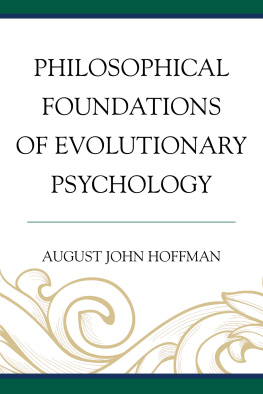
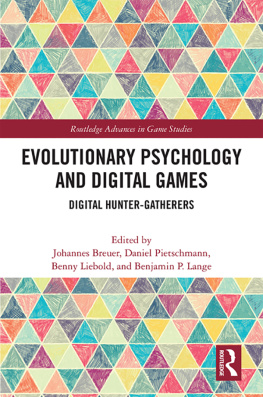

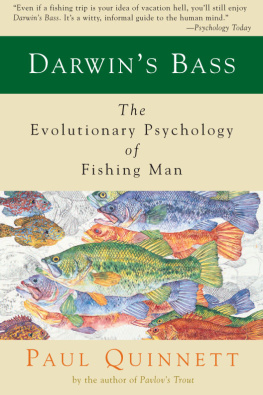
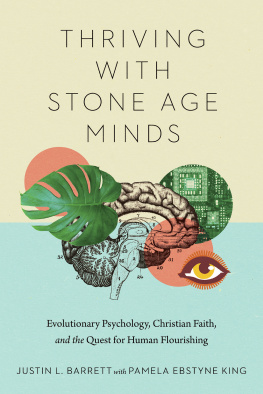



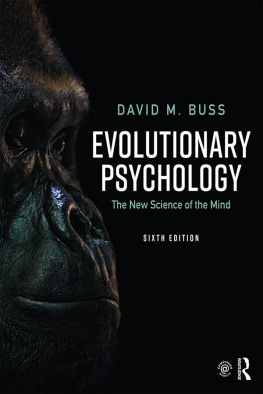

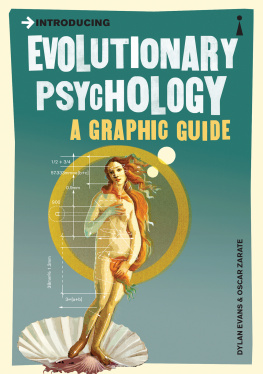


 The paper used in this publication meets the minimum requirements of American National Standard for Information SciencesPermanence of Paper for Printed Library Materials, ANSI/NISO Z39.48-1992.
The paper used in this publication meets the minimum requirements of American National Standard for Information SciencesPermanence of Paper for Printed Library Materials, ANSI/NISO Z39.48-1992.